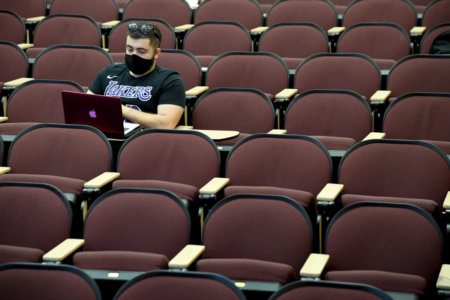
New college students — welcome to the world of academic writing. From here on, this will be your main style of writing for almost every assignment or exam you complete.
Academic English is a language system with its own rules and conventions. Also known as “academic style” and “academic English”, it’s formal, has structure and is backed by evidence. Different disciplines will have different writing conventions, though there are general traits that apply across all disciplines.
Here are our top tips to help new students with academic writing:

It takes time to get used to referencing and using the correct style. Source: Cristina Quicler/AFP
Know your referencing style!
In academic writing, you will need to provide references. To do so, there are three major citation styles used: Modern Language Association (MLA), American Psychological Association (APA) and Chicago. They support two styles: Notes and Bibliography or Author-Date.
To know which style you use, ask your instructor and classmates which is appropriate. If the option is flexible, check out this guide from the University of Washington, to find out which suits you best.
It takes time to get used to referencing and using the correct style. The earlier you get a hang on this, the easier it will be (and to avoid a situation as in the GIF above) when it comes time to submit assignments.
Plagiarism: Know it. Understand it.
Plagiarism is a huge problem in colleges today. It takes many forms, from verbatim copying to less obvious forms, like copying someone else’s ideas and passing it off as your own.
While TurnItIn – a detection service many colleges and universities use to spot plagiarism – may not be able to spot the latter, it doesn’t mean that your lecturers won’t.
Take time to understand the various types of plagiarism – this ranking of plagiarism types lists them according to how academically dishonest and how common it is – so you can avoid them as best as you can.
Don’t rely on Google Translate
For international students, writing in English is tough enough without having to follow the academic style. But don’t be discouraged by this – even English speakers from the US would have trouble adjusting to British English and vice versa.
To write English like a professor, don’t rely on Google translate http://t.co/N49kmPK9AM #mostread
— The Conversation (@ConversationUK) June 8, 2014
But don’t take the seemingly easy way out by writing in your mother tongue and translating it on Google Translate. For one, the technology isn’t perfect yet and could result in huge errors in context and grammar.
You’ll be losing out on “full engagement” with the academic community, too. Mike Groves who heads the Centre for English Language Education at the Malaysia Campus of the University of Nottingham wrote in The Conversation: “What Google translate is unable to do is teach the deeper academic literacies needed by students for full engagement with the academic community.
“Alongside these debates, it’s important to remember that this type of English teaching is all about language being used to express complex ideas, and it is impossible to teach without a certain complexity and depth of content. It is also about aligning to the intellectual norms of academia, which generally involves a large amount of analysis and picking apart of concepts within a rigorous intellectual framework.”
Seek help. Take classes.
For international students, academic writing can be really tough to learn. Thankfully, many colleges today offer classes that teach “English for academic purposes”, even some tailored specifically for those who use English as a secondary language. These are usually conducted by the English language teaching department and international students having trouble with academic writing should definitely get involved!










